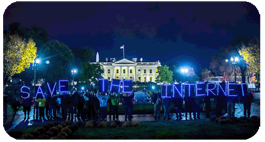 Over the last few years, net neutrality has appeared as a subject of debate everywhere from Internet forums to the highest levels of government. As of February 26, 2015 however, the Federal Communications Commission may have ended the discussion once and for all. On that day, the FCC voted to classify Internet providers as public utilities, thus preventing them from extending better service to websites who pay more money. The decision was a victory for the Internet’s many net neutrality supporters as well as big-time allies like Google and Facebook. Meanwhile, opponents of the issue in the telecom industry are expected to challenge the FCC’s decision.
Over the last few years, net neutrality has appeared as a subject of debate everywhere from Internet forums to the highest levels of government. As of February 26, 2015 however, the Federal Communications Commission may have ended the discussion once and for all. On that day, the FCC voted to classify Internet providers as public utilities, thus preventing them from extending better service to websites who pay more money. The decision was a victory for the Internet’s many net neutrality supporters as well as big-time allies like Google and Facebook. Meanwhile, opponents of the issue in the telecom industry are expected to challenge the FCC’s decision.
The creation of so-called “Internet fastlanes” lies at the heart of the net neutrality debate. Internet providers have long lobbied for permission to grant higher connection speeds to websites that pay for the privilege, which subsequently “throttles” the connections of sites that choose to opt out. Net neutrality activists argue that this would hurt the freedom of the Web since it makes one site’s content more accessible than another’s. After all, electric companies can’t get away with selling “premium electricity” to clients who can pay more for it.
“For most Americans, the Internet has become an essential part of everyday communication and everyday life,” said President Obama last year, a sentiment that rings true to many net neutrality supporters. With so much of the country dependent on Web access, it makes sense for the FCC to be skeptical of the telecom industry’s intentions over fastlanes and throttling data. Still, just because this initial decision has been made doesn’t mean the rules are set in stone just yet. Not only will it take months for the regulations to go into effect, the FCC is also expected to face numerous lawsuits challenging its decision. Experts expect the rules will stay in place, however, given the immense amount of public support for net neutrality as well the endorsements of the President and big tech companies.
Questions:
- Do administrative agencies such as the FCC make laws?
- Why are telecom companies interested in creating “fastlanes” on the Internet?
Source: Cecilia Kang and Brian Fung, “The FCC Approves Strong Net Neutrality Rules,” The Washington Post, February 26, 2015. Photo by: Joseph Gruber.
